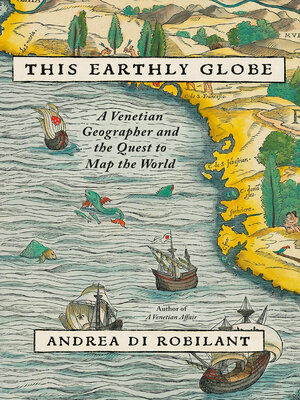This Earthly Globe
ebook ∣ A Venetian Geographer and the Quest to Map the World
By Andrea Di Robilant

Sign up to save your library
With an OverDrive account, you can save your favorite libraries for at-a-glance information about availability. Find out more about OverDrive accounts.
Find this title in Libby, the library reading app by OverDrive.



Search for a digital library with this title
Title found at these libraries:
| Loading... |
From the author of the best-selling A Venetian Affair (“A narrative of novelistic resonance . . . Astonishing” —The Washington Post), the story of an Italian Renaissance book editor who introduced European minds to the wider world through his passion for geography
In the autumn of 1550, a thick volume containing a wealth of geographical information new to Europeans, with startling wood-cut maps of Africa, India and Indonesia, was published in Venice under the title Navigationi et Viaggi (Journeys and Navigations). The editor of this remarkable collection of travelogues, journals and classified government reports remained anonymous. Two additional volumes delivered the most accurate information on Asia and the “New World” available at the time. The three volumes together constituted an unparalleled release of geographical data into the public domain. It was, Andrea di Robilant writes, the biggest Wikileak of the Renaissance.
In This Earthly Globe, di Robilant brings to life the palace intrigues, editorial wheedling, delicate alliances and vibrant curiosity that resulted in this coup by the editor Giovambattista Ramusio. Learned and self-effacing, he gathered a vast array of both popular and closely guarded narratives, from the journals of Marco Polo (he fact-checked them!) to detailed reports on Northern African cultures from the Muslim scholar and diplomat al-Hasan ibn Mohammad al-Wazzan (later known as Leo Africanus). Diverse voices spill out from these chapters as di Robilant recounts how Ramusio pursued the sources, and how he understood both the darker episodes of “exploration” involving colonial violence and the voyage stories which included accounts of people from African and Asian lands, who had a great deal to share about their cultures. The result is a far-flung and delightful homage to one of the founding fathers of modern geography.
In the autumn of 1550, a thick volume containing a wealth of geographical information new to Europeans, with startling wood-cut maps of Africa, India and Indonesia, was published in Venice under the title Navigationi et Viaggi (Journeys and Navigations). The editor of this remarkable collection of travelogues, journals and classified government reports remained anonymous. Two additional volumes delivered the most accurate information on Asia and the “New World” available at the time. The three volumes together constituted an unparalleled release of geographical data into the public domain. It was, Andrea di Robilant writes, the biggest Wikileak of the Renaissance.
In This Earthly Globe, di Robilant brings to life the palace intrigues, editorial wheedling, delicate alliances and vibrant curiosity that resulted in this coup by the editor Giovambattista Ramusio. Learned and self-effacing, he gathered a vast array of both popular and closely guarded narratives, from the journals of Marco Polo (he fact-checked them!) to detailed reports on Northern African cultures from the Muslim scholar and diplomat al-Hasan ibn Mohammad al-Wazzan (later known as Leo Africanus). Diverse voices spill out from these chapters as di Robilant recounts how Ramusio pursued the sources, and how he understood both the darker episodes of “exploration” involving colonial violence and the voyage stories which included accounts of people from African and Asian lands, who had a great deal to share about their cultures. The result is a far-flung and delightful homage to one of the founding fathers of modern geography.






